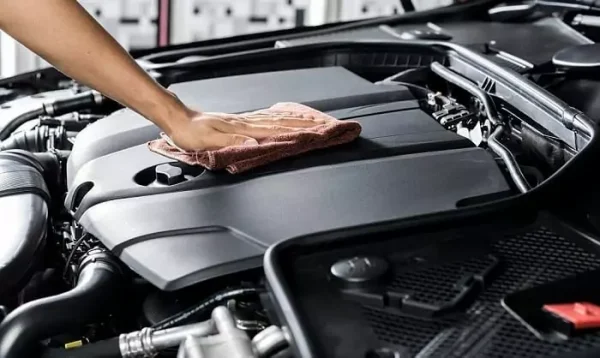A clean engine ensures optimal performance, prevents overheating, and boosts your car’s resale value. With the right tools and safety precautions, you can restore your engine’s efficiency and keep it in peak condition.
Key Takeaway
- Regular engine cleaning enhances your car’s performance, prevents corrosion, and aids in spotting issues early. By following proper steps and safety tips, you can safely clean your engine and maintain its efficiency.
A clean engine isn’t just about aesthetics—it’s a cornerstone of your car’s longevity and performance. Over time, dirt, grease, and grime accumulate under the hood, potentially causing mechanical issues or reducing efficiency. Cleaning your car engine might seem like a daunting task, but with the right tools and approach, it can be done effectively and safely.
This guide explains why engine cleaning matters, offers step-by-step instructions, and highlights safety precautions to help you restore your engine to pristine condition.
Contents
Why Cleaning Your Engine Matters?
An engine covered in grime doesn’t just look bad—it can lead to functional problems. Here’s why engine cleaning is essential:
1. Improved Performance: A cleaner engine can dissipate heat more effectively, preventing overheating.
2. Easier Maintenance: Spotting leaks or worn components is simpler on a clean engine.
3. Resale Value: A well-maintained engine bay makes a better impression on potential buyers.
Signs Your Engine Needs Cleaning
1. Visible Grease And Grime: Thick layers of dirt or oil coating the engine components.
2. Unusual Odors: Burning smells from grease buildup near hot engine parts.
3. Overheating Issues: Excessive grime can trap heat, causing the engine to overheat.
Step-by-Step Guide To Cleaning A Dirty Engine
1. Choose A Nice Sunny Day
Choosing a nice sunny day with low humidity and little wind is ideal as it allows the engine and other components to dry quickly after cleaning.
2. Cool Down Your Car’s Engine
If your car has been running and the engine is hot, raise the hood and let the engine cool for at least 20 minutes.If you don’t do all that and start engine cleaning right away, in that case, the hot engine, as well as all other components, can cause your skin to burn, but also the entire engine can be damaged, thus making big damage to both your vehicle and yourself.

3. Removed The battery
Before you start engine cleaning , first remove the battery, as this will protect all electrical components from damage. Also, remove all plastic covers and parts under the hood as they all need to be cleaned separately.

4. Cover All Sensitive Parts
It is also a very important detail that if you have an open engine air intake under the hood, you have to cover it all. It is very important because with the protection of these electronics you will be able to perform a much more detailed cleaning of the engine without fear of damaging something important.
5. Use A Means For Degreasing
Spray the engine completely with a degreaser, whereby every part should be completely covered. We leave it to you to decide what means you will use without giving you suggestions (since we do not want to advertise any product). But keep in mind that with any degreaser you will achieve the right goal, whether it is a household degreaser or a dedicated engine degreaser.

6. Scrub Certain Parts Around The Engine
The application of this advice depends on how dirty the car engine is. However, keep in mind that some parts of the engine, such as the valve cover, have accumulated a lot of dirt and oil residue over time. Therefore, it is necessary to use a small synthetic brush (we remind you not to use a metal brush) to remove all the dirt collected here. If necessary, you must add more degreasing agents.

7. Rinse The Engine
When you get to this part of the procedure take your hose from the garage and along with the sprayer start washing the entire engine starting from the back to the front and remove all the degreaser that you have previously applied.
Our advice is not to spray a large amount of water in those parts of the engine where they will not dry easily, as well as not to spray water directly on the electrical components even though you have previously wrapped them with plastic bags.

8. Dry The Engine
If you have compressed air available, you can directly release it on the engine in order to remove the excess water that has collected on certain parts.
If you don’t have all that available, then use a cloth and wipe everything you can reach with your hand. This will wipe out the water as well as remove any remaining dirt.
9. Put The Battery Back
After the engine is completely dry, return the battery to its place and also remove the plastic bags covering the electrical components.

10. Repeat The Engine Cleaning More Often
The main factor in making this whole procedure the simplest is to not let your engine and the area around it get too dirty. Degreasing the engine should be done more often, every one or at most two years will allow you to keep your engine clean and the entire reading procedure will take you no more than an hour. Keeping the engine and the area around it clean and tidy will surely make you feel happy and satisfied.
Safety Tips For Engine Cleaning
1. Avoid High Pressure: High-pressure water can damage components or force water into sealed areas.
2. Use Engine-Safe Products: Only use degreasers and cleaning agents designed for automotive engines.
3. Work In A Well-Ventilated Area: Degreasers can release fumes—ensure good ventilation during cleaning.
When To Seek Professional Help
For heavily soiled engines or modern cars with sensitive electronics, professional cleaning may be the best option. Professional services use steam cleaning or chemical treatments to clean thoroughly without risking damage.
Benefits Of Regular Engine Cleaning
1. Prevents Corrosion: Dirt and moisture can lead to rust or corrosion over time.
2. Identifies Problems Early: A clean engine bay makes leaks and wear easier to spot.
3. Enhanced Fuel Efficiency: Removing grime helps components work more efficiently.
Why Is Cleaning Your Car Engine Important?
Cleaning your car engine improves performance, prevents overheating, and extends its lifespan. Regular maintenance keeps your car running smoothly and efficiently.
Conclusion: Keep Your Engine Clean And Efficient
Dirty engine cleaning isn’t just about appearances—it’s an investment in your car’s performance and lifespan. With the right approach and tools, you can restore your engine’s efficiency and prevent future issues.
A clean engine bay not only improves functionality but also signals responsible ownership to potential buyers. Make engine cleaning a part of your routine maintenance, and enjoy the benefits of a well-maintained vehicle.



0 Comments